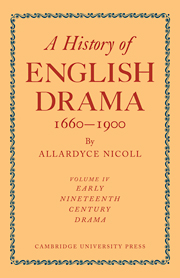Book contents
- Frontmatter
- PREFACE
- Contents
- PART I
- Chapter One THE THEATRE
- Chapter Two THE DRAMATIC CONDITIONS OF THE AGE
- Chapter Three THE ILLEGITIMATE DRAMA
- Chapter Four THE LEGITIMATE DRAMA
- Chapter Five THE STILL-BORN DRAMA
- Chapter Six CONCLUSION
- SUPPLEMENTARY NOTES
- Appendix A THE THEATRES, 1800–1850
- PART II
- SUPPLEMENTARY NÓTES TO THE HAND-LIST OF PLAYS 1800–1850
- INDEX OF PERSONS AND SUBJECTS
Chapter One - THE THEATRE
Published online by Cambridge University Press: 07 October 2011
- Frontmatter
- PREFACE
- Contents
- PART I
- Chapter One THE THEATRE
- Chapter Two THE DRAMATIC CONDITIONS OF THE AGE
- Chapter Three THE ILLEGITIMATE DRAMA
- Chapter Four THE LEGITIMATE DRAMA
- Chapter Five THE STILL-BORN DRAMA
- Chapter Six CONCLUSION
- SUPPLEMENTARY NOTES
- Appendix A THE THEATRES, 1800–1850
- PART II
- SUPPLEMENTARY NÓTES TO THE HAND-LIST OF PLAYS 1800–1850
- INDEX OF PERSONS AND SUBJECTS
Summary
Introductory
In the year 1801 there was billed to appear at one of the “minor” theatres a certain precocious child named as “Master Carey, the Pupil of Nature.”. While never rivalling the attraction later exercised by “the infant Roscius” (young Betty), Master Carey seems to have caused a little sensation among the novelty-loving audience of the period, and that sensation was no doubt stimulated when it was noised abroad that the clever child was a great-grandson of no less a person than the facetious Harry Carey, author of Chrononhotonthologos and of the still more famous Sally in our Alley, both still played or sung in those years. The sensation, however, would have been yet greater had the spectators of the period possessed a divining insight to display to them the future glory of the dark-eyed child-actor. Many of those who saw the boy Carey acting in 1801 at a minor theatre no doubt flocked to the patent houses in 1814 to witness the same boy, now grown into a man, seize with the powerful hand of a master upon the emotions of the playhouse and interpret Shakespeare in a manner all his own. The Master Carey of 1801 had returned to gain mature triumph under the name of Edmund Kean.
This concrete example serves to indicate how close, in time and generation, were the ties between the early nineteenth century and the days when first the sprightly rimes and dainty tunes of The Beggar's Opera charmed the fashionable society of London.
- Type
- Chapter
- Information
- A History of English Drama 1660-1900 , pp. 1 - 57Publisher: Cambridge University PressPrint publication year: 1955



